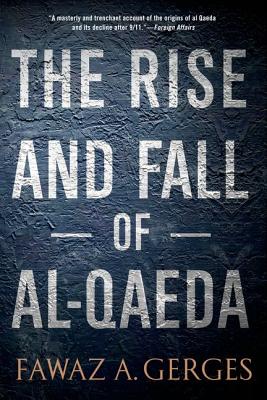

 Oxford University Press, USA
Oxford University Press, USA
Rise and Fall of Al-Qaeda


Key Metrics
- Fawaz A Gerges
- Oxford University Press, USA
- Paperback
- 9780199974689
- 8.42 X 5.52 X 0.7 inches
- 0.62 pounds
- Political Science > Terrorism
- English
 Secure Transaction
Secure TransactionBook Description
In The Rise and Fall of Al-Qaeda, Gerges, a public intellectual known widely for his expertise on radical ideologies, including jihadism, argues that the Western powers have become mired in a terrorism narrative, stemming from the mistaken belief that America is in danger of a devastating attack by a crippled al-Qaeda. To explain why al-Qaeda is no longer a threat, he provides a briskly written history of the organization, showing its emergence from the disintegrating local jihadist movements of the mid-1990s-not just the Afghan resistance of the 1980s, as many believe-in a desperate effort to rescue a sinking ship by altering its course. During this period, Gerges interviewed many jihadis, gaining a first-hand view of the movement that bin Laden tried to reshape by internationalizing it. Gerges reveals that transnational jihad has attracted but a small minority within the Arab world and possesses no viable social and popular base. Furthermore, he shows that the attacks of September 11, 2001, were a major miscalculation--no river of fighters flooded from Arab countries to defend al-Qaeda in Afghanistan, as bin Laden expected. The democratic revolutions that swept the Middle East in early 2011 show that al-Qaeda today is a non-entity which exercises no influence over Arabs' political life.
Gerges shows that there is a link between the new phenomenon of homegrown extremism in Western societies and the war on terror, particularly in Afghanistan-Pakistan, and that homegrown terror exposes the structural weakness, not strength, of bin Laden's al-Qaeda. Gerges concludes that the movement has splintered into feuding factions, neutralizing itself more effectively than any Predator drone.
Forceful, incisive, and written with extensive inside knowledge, this book will alter the debate on global terrorism.
Author Bio
Fawaz A. Gerges is Professor of International Relations at the London School of Economics and Political Science (LSE), and holder of the Emirates Professorship in Contemporary Middle East Studies. He was also the inaugural Director of the LSE Middle East Centre from 2010 until 2013.
He earned a doctorate from Oxford University and M.Sc. from the London School of Economics. Gerges has taught at Oxford, Harvard, and Columbia, and was a research scholar at Princeton and the chairholder of the Christian A. Johnson Chair in Middle Eastern Studies and International Affairs at Sarah Lawrence College, New York.
His special interests include Islam and the political process, social movements, including mainstream Islamist movements and jihadist groups (like the Muslim Brotherhood and Al Qaeda), Arab politics and Muslim politics in the 20th century, the international relations of the Middle East, the Arab-Israeli conflict, state and society in the Middle East, American foreign policy towards the Muslim world, the modern history of the Middle East, history of conflict, diplomacy and foreign policy, and historical sociology.
Gerges’ most recent books are Making the Arab World: Nasser, Qutb, and the Clash that Shaped the Middle East (Princeton University Press, 2018), ISIS: A History (Princeton University Press, 2016) and The New Middle East: Protest and Revolution in the Arab World (Cambridge University Press, November 2013). He is also the author of several acclaimed books: Journey of the Jihadist: Inside Muslim Militancy (Harcourt Press, 2007), and The Far Enemy: Why Jihad Went Global (Cambridge University Press, 2005). The Washington Post selected The Far Enemy as one of the best 15 books published in the field. Journey of the Jihadist was on the best-selling list of Barnes and Nobles and Foreign Affairs Magazine for several months.
Gerges' upcoming book is The Hundred Years’ War for Control of the Middle East: From Sykes-Picot to the Deal of the Century (Princeton University Press, 2021).
Gerges has been the recipient of a MacArthur, Fullbright and Carnegie Fellowships and his books, including America and Political Islam: Clash of Cultures or Clash of Interests? (Cambridge University Press, 2000) and The Superpowers and the Middle East: Regional and International Politics (Oxford and Westview), have been translated into a number of foreign languages.
No armchair historian, Gerges was recently a Carnegie Scholar, where he completed extensive field study in the Middle East. Over the years, he has interviewed hundreds of civil society leaders, activists, and mainstream and radical Islamists in the Muslim world and within Muslim communities in Europe.
His articles and editorials have appeared in The New York Times, The Washington Post, The Los Angeles Times, The Christian Science Monitor, International Herald Tribune, The Guardian, The Baltimore Sun, The Independent (London), Al Hayat (London), Foreign Affairs, Foreign Policy, Newsweek, The National Interest, Democracy: a Journal of Ideas, Middle East Journal, Survival, Al Mustqbal al-Arabi, Middle East Insight, and many others.
Gerges has given scores of interviews for various media outlets throughout the world, including ABC, CNN, BBC, PBS, CBS, NPR, CBC, Sky News, Al Jazeera, and LBC. He has been a guest on The Charlie Rose Show, The Oprah Winfrey Show, The Bill Moyers Journal, The NewsHour with Jim Lehrer, ABC Nightline, World News Tonight, Rachel Maddow Show (MSNBC), This Week, Good Morning America and other prominent shows. He was a senior ABC television news analyst from 2000 until 2007.
Source: The London School of Economics and Political Science
Videos




Community reviews
Write a ReviewNo Community reviews